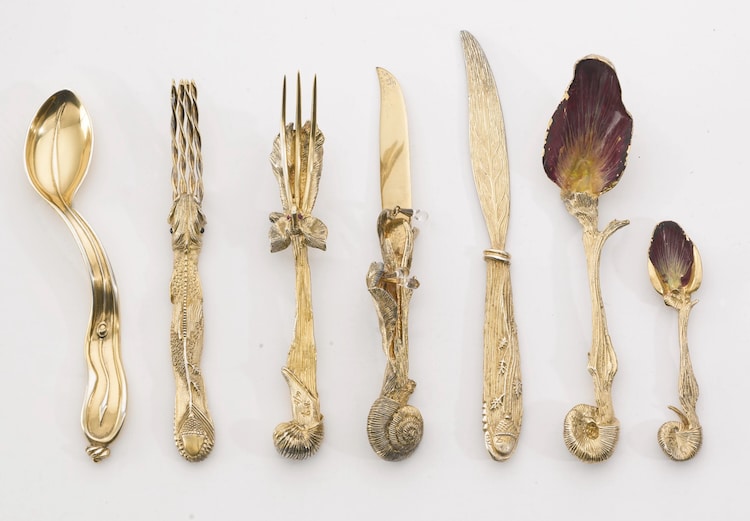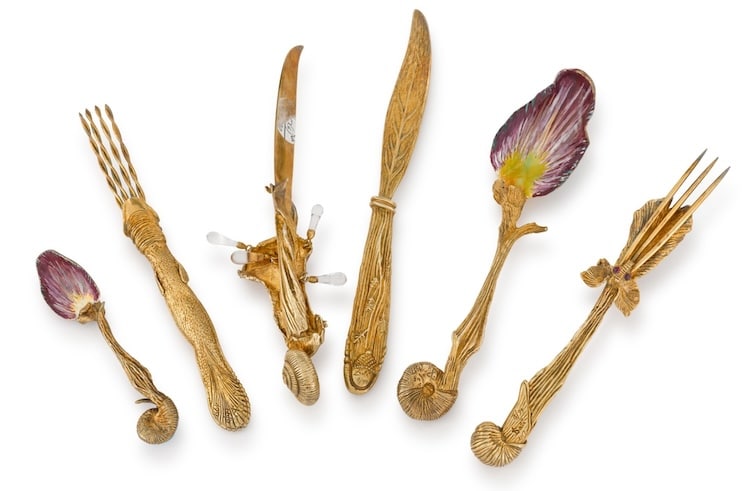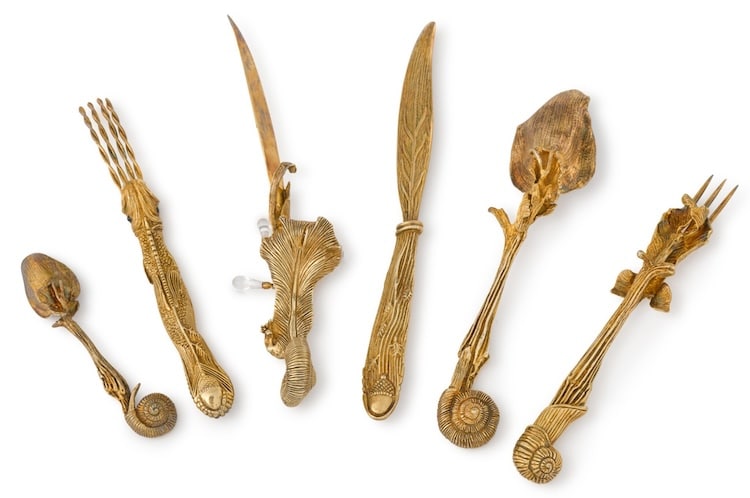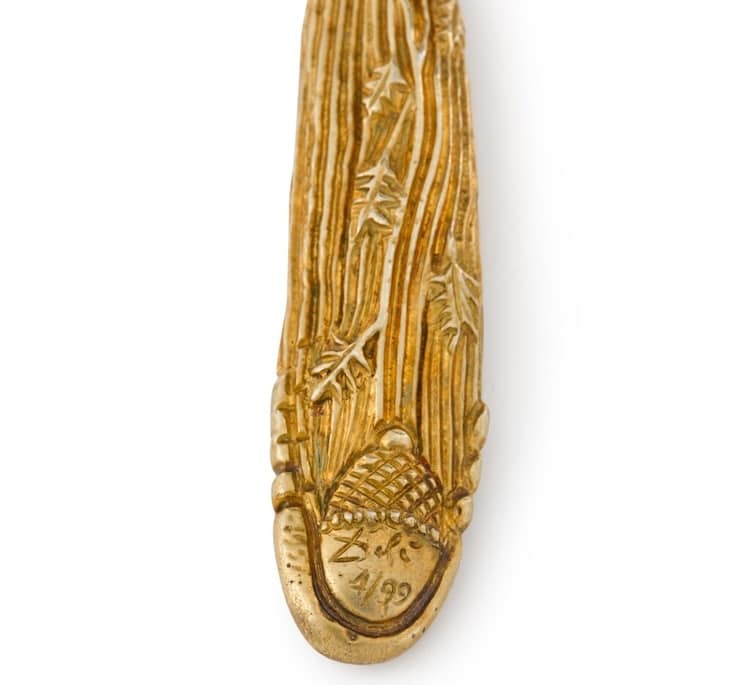
Photo: Sothebys
Iconic artist Salvador Dalí is undoubtedly a Surrealist superstar. Beyond the signature mustache, his art and philosophy have heavily influenced the way that artists express their innermost thoughts. In his prime, constructs of time, memory, dreams, and the unpredictability of the imagination interested Dalí and his Surrealist contemporaries. These concepts are well-known today to have been explored in their paintings, but Dalí also applied them to his lesser-known works, including a six-piece tableware set. Comprised of an elephant fork, snail knife, leaf knife, two artichoke spoons, and a fish fork, Dalí brings to life these biomorphic forms in a unique way, tapping into the bounty of our imagination.
Purchased in 2012 for $28,125, this fanciful cutlery set is a thought-provoking collection inspired by nature. Dalí’s elephant fork is constructed of three sharp-ended prongs that lay on a bed of two leaf-shaped pieces. The elephant head sits just below the prongs with two red eyes and wing-shaped ears. Biomorphic curves that comprise the snail knife emit the paradoxical state in which these invertebrates live. The soft inner bodies and hard outer shells of snails are a paradox that enchanted Dalí and inspired him to explore this in visual art. This tableware series clearly takes inspiration from the shape and textures of leaves, transforming foliage into something nearly unrecognizable.
Take a closer look at the two artichoke spoons. Slightly different in size, the oval-shaped head of the spoons have jagged edges that emit the organic leaves of an artichoke. Deep purple with stripes of light blue, yellow, and green add depth. Finally, the fish fork. Four prongs twisted like vines protrude from the end of this object. The body is covered in scales, fins, eyes, and a tail, almost as if this fish could swim away, right before your eyes. At the heart of it, Surrealist works are concerned with the psychological, biomorphic forms, and the fragments of dreams. The ambiguity of dreams prompts artists like Dalí to explore the power of curiosity. The Spanish artist embraces the foundational components of Surrealism and activates different sensations in the process.
Dalí used a variety of materials to create these pieces. As far as the eye can tell, one might draw the conclusion that they are made up of gold; however, Dalí utilized the process of silver-gilt instead—which is silver covered in gold. The artist also used a variety of supplementary substances and textures to emphasize the creativity of his design. For example, the sapphire eyes of the fish, ruby eyes of the elephant, and the snail knife adorned with rock crystals seem to be animated. In using these materials together, Dalí juxtaposes the experience of fine dining and the commonplace of nature.
On a similar note, the artist explored the relationship between Surrealism and cuisine in his cookbook Les Diners De Gala, published in 1973. In this literary work, Dalí uses the written word as a way to convey the subconscious. Containing 136 recipes for out-of-this-world ingredients like “thousand-year-old eggs,” quail, and toffee paired with something you would find in a your backyard—pine cones. Dalí takes readers on a journey to the most unrealistic places, yet there is something intriguing about the nonsensical characteristic of this artistic style. The imagination manifests visually in his works, but especially in the cutlery set of 1957. The multi-hyphenate innovator rebels and pushes against the boundaries of art that have been defined by creative styles throughout history.
Dalí has curated a visual narrative that is multi-sensory, activating touch and sight, and even inspiring viewers to imagine what it would be like to actually use these pieces of silverware. Taking inspiration from the natural world, the artist challenges the way that we use these everyday objects. Stepping outside of his well-known works, The Persistence of Memory and The Elephants, this silverware brings to life Surrealist practices in an inventive way. Dalí runs with his imagination, letting it flow freely, embracing the whimsical nature of Surrealism and nonsensical representations of everyday life.
Salvador Dalí is well-known today for his surreal paintings of melting clocks (and his playfully coifed mustache).
View this post on Instagram
But did you know the famed artist also designed a surreal silverware set in 1957?

Photo: Sothebys
The cutlery collection consists of six pieces that include two forks, two knives, and two spoons.

Photo: Sothebys
Each component has unique textures and takes inspiration from different forms found in nature.

Photo: Sothebys
And 16 years later, Dalí designed Les Diners De Gala, a surrealist cookbook that further blurs the lines between cuisine, dining, and art.
View this post on Instagram
The Dalí Museum: Website | Instagram | Facebook
h/t: [Open Culture]
This post may contain affiliate links. If you make a purchase, My Modern Met may earn an affiliate commission. Please read our disclosure for more info.
Related Articles:
5 Salvador Dalí Paintings That Perfectly Capture the Surrealist’s Subconscious Mind
20 Surreal Facts About Salvador Dalí
Salvador Dalí’s Rarely Seen ‘Alice in Wonderland’ Illustrations Are Finally Reissued
Exploring the Experimental and Avant-Garde Art of Surrealism
